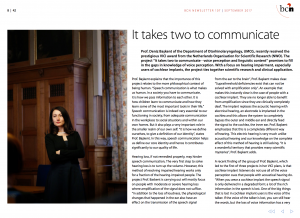Neural entrainment to speech modulates speech intelligibility ?
Date: 23 June 2017, 15:00
Location: UMCG, Panoramazaal, U4.123
Broadcasting link: https://tinyurl.com/23-06-2017-Auditory-Seminar2
Dr. Lars Riecke
Department of Cognitive Neuroscience
Faculty of Psychology and Neuroscience
University of Maastricht
Speech entrainment, the alignment of neural activity to the slow temporal fluctuations (envelope) of acoustic speech input, is ubiquitous in current theories of speech processing. Associations between speech entrainment and acoustic speech signal, behavioral listening task, and speech intelligibility have been observed repeatedly. However, a methodological bottleneck has prevented clarifying whether speech entrainment functionally contributes to speech intelligibility. Here, we addressed this issue by experimentally manipulating speech entrainment in the absence of systematic acoustic and task-related changes with a novel approach that involves stimulating listeners with transcranial currents carrying speech-envelope information. Results from two experiments involving a cocktail party-like scenario and a listening situation devoid of acoustic envelope information show consistently an effect on listeners’ speech-recognition performance, demonstrating a causal role of speech entrainment for speech intelligibility. This finding supports entrainment-based theories of speech comprehension and suggests that transcranial stimulation with speech envelope-shaped currents can be utilized to modulate speech comprehension.
 A very nice interview by Elouise Koops covers our new VICI grant in the BCN newsletter.
A very nice interview by Elouise Koops covers our new VICI grant in the BCN newsletter.